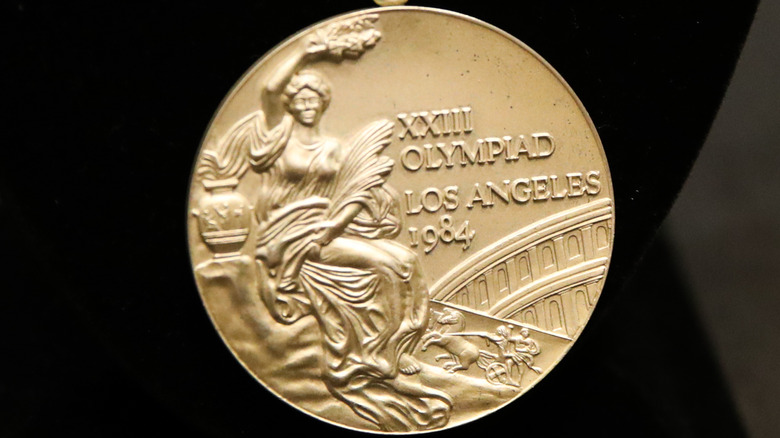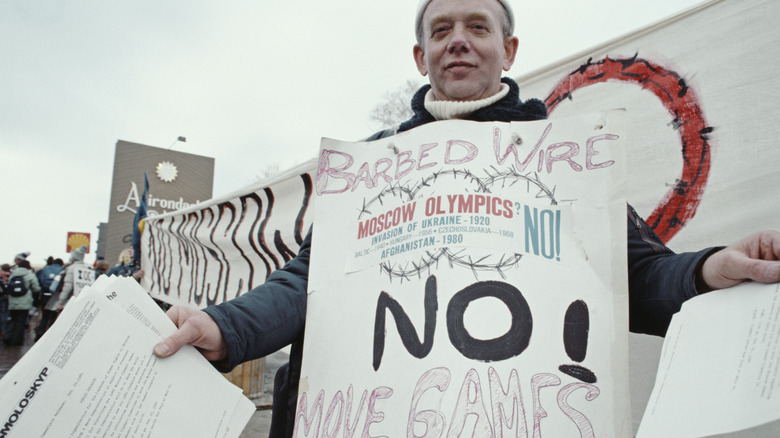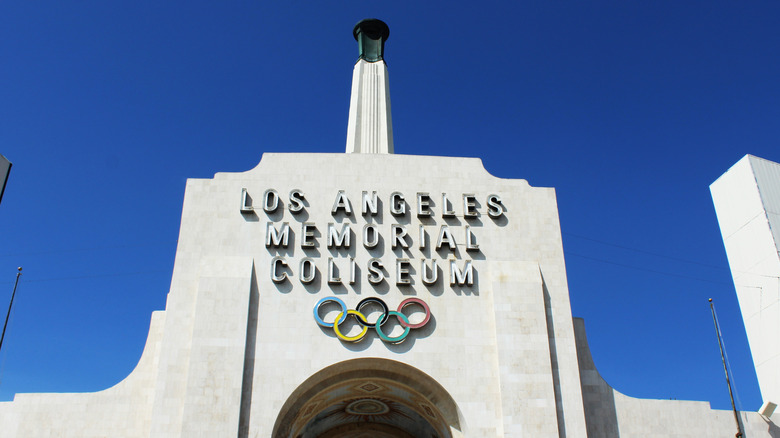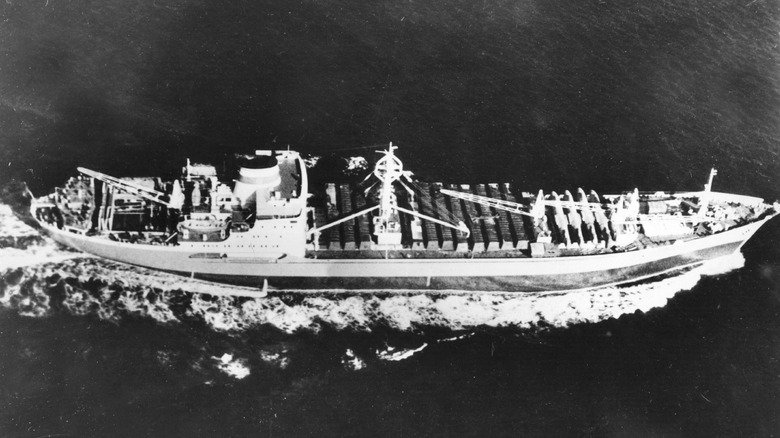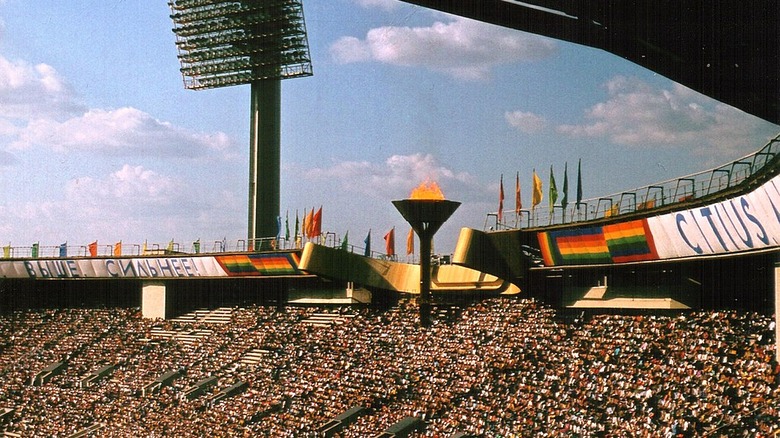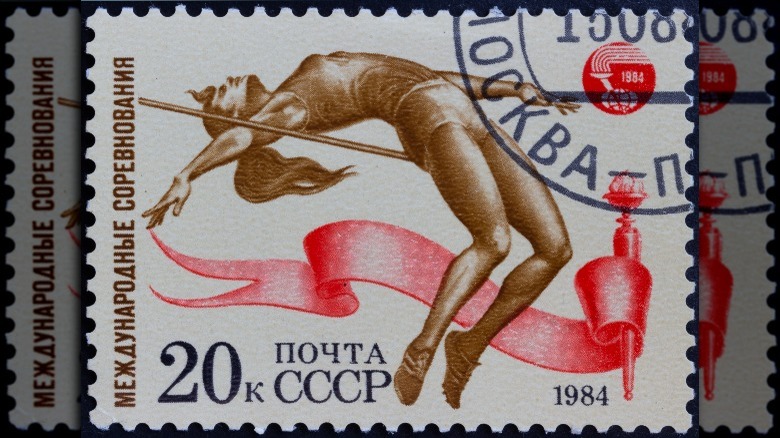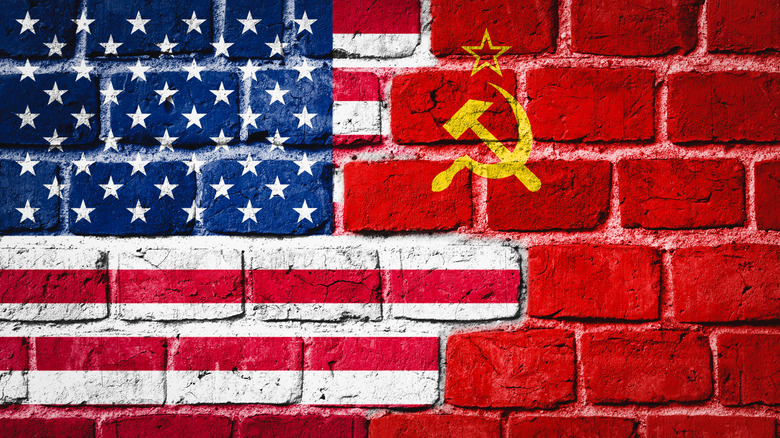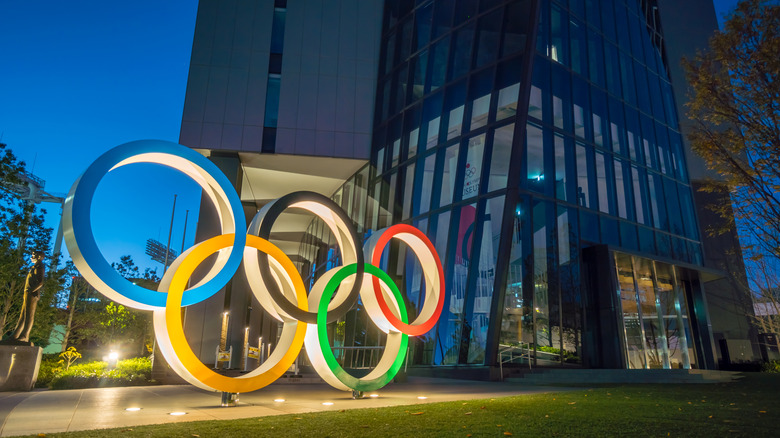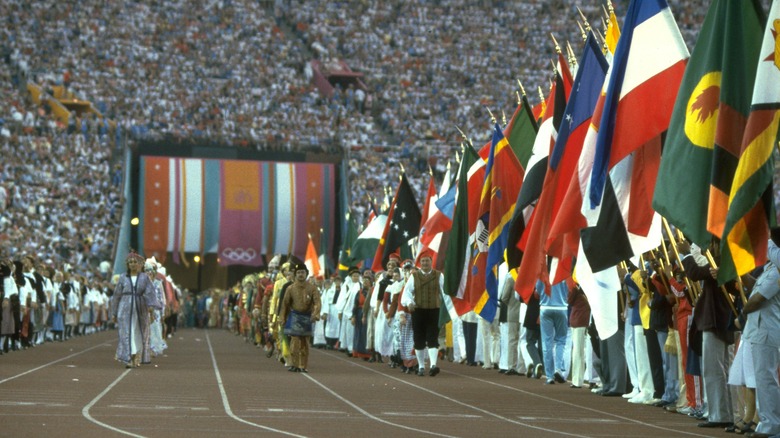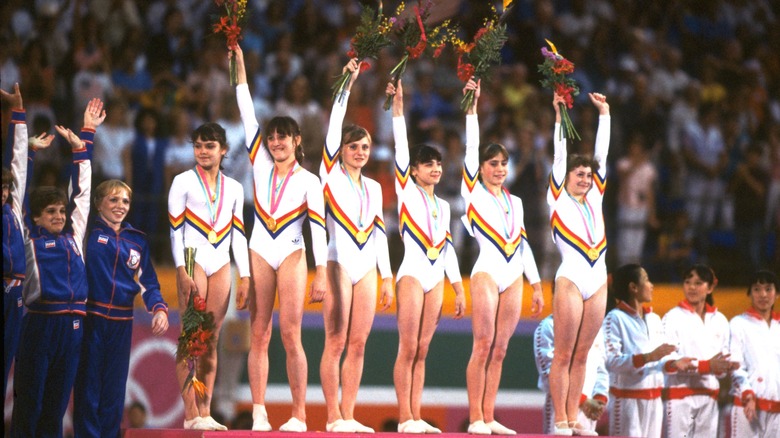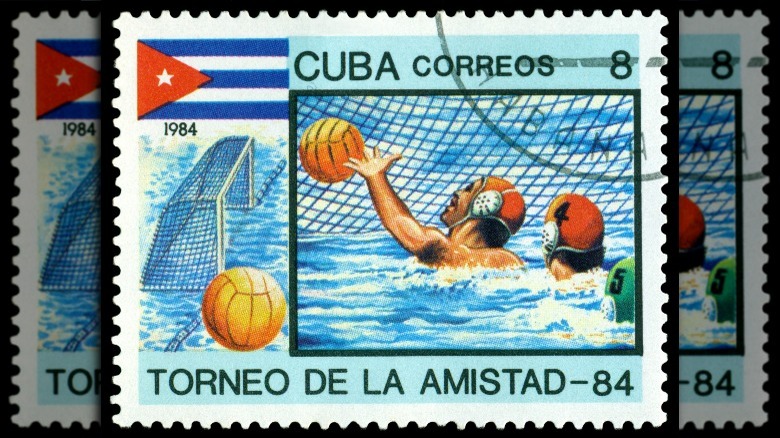Inside The Soviet Boycott Of The 1984 Olympics
It's 1984, and Cold War tensions between the Soviet Union and the United States have been on the rise again for the past half a decade. But all the same, the Summer Olympics are right around the corner, and Los Angeles is ready to play host to the Games. Hours of planning and preparations have gone into making this one of the most successful Olympic Games ever.
But then, all of a sudden, on May 8, 1984 the Soviet Union made an announcement to the rest of the world. They would be boycotting the Olympic Games. Right on the heels of that announcement came a bunch of others. East Germany, Cuba, Hungary — in all, 17 other communist nations, many bound by the Warsaw Pact, also pulled out of the Olympics, taking with them a good few of the world's best athletes. And that's no exaggeration: Six of the top 10 medal-winning countries in the 1976 Montreal Olympics would be sitting out the Games that year.
But when all was said and done, the United States came out of the event with a record number of gold medals, as well as an insanely financially successful Olympics, turning a quarter of a billion dollars in profit. But given that the Olympics — which were founded as a way to put politics and war aside — were so deeply infiltrated by, well, politics and war, there's clearly a lot more story to what happened with the 1984 Olympics.
The 1980 Moscow Olympics Boycott
When it comes to the "why" behind the boycott of the 1984 LA Olympics, it's kind of relevant to know that this particular boycott isn't exactly unique. While it's true that a whole host of major countries choosing to sit out one of the Olympics isn't the norm, there had actually already been another Olympic boycott only four years earlier: the U.S. boycott of the 1980 Moscow Olympics.
That boycott was born pretty clearly out of Cold War tensions. According to History, just a year before in 1979, the Soviet Union had invaded Afghanistan; the U.S. demanded that the Soviets pull out their troops by February 20, 1980, but that didn't happen. The U.S. set restrictions on trade with the Soviet Union, for one, but President Jimmy Carter also announced on March 21 that the US wouldn't be participating in the 1980 Moscow Olympics in response. On top of that, the U.S. tried to convince its allies to join in the boycott. Granted, per Politico, the boycott wasn't actually all that successful, with most of Europe electing to still compete, though a few countries — Japan, West Germany, and Canada — did join in the boycott.
In the end, though, multiple sources will cite the 1980 boycott as one of the reasons for the 1984 one. It was essentially an act of revenge by the Soviets against the U.S. If the U.S. could boycott the Games in Moscow, then they could boycott those in LA.
The Ban the Soviets Coalition
Times were turbulent leading up to the 1984 Olympics. In late 1983, a Soviet jet shot down a South Korean airliner that had passed into Soviet airspace, killing hundreds of people on board, according to "Boycott of the Los Angeles 1984 Olympic Games as an Example of Political Play–Acting of the Cold War Superpowers."
Of course, that didn't go over well with the U.S., but one of the more specific effects of that tragedy was the creation of an American group known as the Ban the Soviets Coalition. The group's intentions were exactly as advertised: keep the Soviet athletes from competing in the Olympic Games, and keep them out of LA in general. Per History, they believed that the Soviets shouldn't be allowed to compete in a peaceful event if they couldn't be peaceful on a wider stage (shooting down a passenger plane doesn't really garner sympathy).
On the other hand, if they couldn't keep the Soviets out of the Games, then they would try to push Soviet athletes into defecting from the USSR by showing how much better life in the U.S. was. (This wasn't entirely without precedent. Athletes had actually defected and gone to seek asylum during other Games). The Soviets weren't happy with that idea, though, seeing the Coalition as a militant group, willing to use force to try and kidnap their athletes. Pulling out of the Olympics was just a safety measure, in that case.
The Soviets might have had other reasons for backing out of the 1984 Olympics
This entire boycott is still the subject of some amount of debate, and there isn't just one reason why the Soviet Union decided to pull out of the Olympic Games in 1984.
A couple of the smaller reasons have to do with particular accommodations that the Soviets might not have been incredibly pleased with, as explained by History. One of those concerns might have been over the judging system; there weren't a lot of foreign judges, and their athletes might not be judged fairly as a result. Other accommodations, according to "Boycott of the Los Angeles 1984 Olympic Games as an Example of Political Play–Acting of the Cold War Superpowers," included the place that the athletes could stay. Most Olympic athletes spend their time during the Games at the Olympic Village, but the Soviets wanted their athletes to stay on a Soviet ship docked right in the Los Angeles Harbor. The U.S. just wasn't thrilled with that idea (again, Cold War tensions had everyone on edge).
On top of that are, unsurprisingly, the politics. There might have been hopes that boycotting the Olympics would end up cutting down the profits that the Games would bring into Los Angeles, and doing so might hurt the reputation of Ronald Reagan and ruin his chances of reelection — a potential advantage to the Soviets in the Cold War.
The 1984 Olympics boycott was actually kind of a surprise
On one hand, the Soviet boycott of the 1984 LA Games (and the American boycott of the 1980 Moscow Games, for that matter) really don't seem all that surprising. This was the Cold War, after all; Soviet and American tensions were just a thing, and so finding the two countries at odds really isn't anything odd for the time period. Framing the 1984 boycott as a response to the one four years earlier makes it seem like it was planned, but there's evidence pointing in the other direction.
The Soviets had already dumped a bunch of money into training their athletes prior to the 1984 Olympics (via History). Why spend that much to train for an event that you'd already decided to boycott, possibly as much as four years earlier? And aside from that, "Boycott of the Los Angeles 1984 Olympic Games as an Example of Political Play–Acting of the Cold War Superpowers" raises the point that Soviet IOC member Konstantin Andrianov actually congratulated the LA Olympic Committee for doing such a fine job in organizing the Games. Weird sentiment, all things considered, right?
Well, Soviet politics was part of the reason for the sudden change. At the time that congratulatory statement was made, the Soviet Union was headed up by the more liberal Yuri Andropov. He died just days later, though, and the more conservative Konstantin Chernenko took his place. Almost immediately, Soviet opinions toward the Olympics seemed to shift, and had that change of power not happened, then maybe the boycott wouldn't have either.
The Soviet Union hosted the 1984 Friendship Games instead
With no Olympic Games but a whole host of Olympic athletes, what was the Soviet Union and the rest of the Eastern Bloc to do?
According to World Atlas, from July 2 to September 16, 1984, Moscow put on an alternative version of the Olympic Games known as the Friendship Games. Those games were, in a lot of ways, just set up as a pretty direct parallel to the Olympics, even complete with their own eternal flame, and a full opening ceremony (via New York Times). It was meant to show the world that athletes from communist countries could compete and hold themselves to Olympic ideals, and that those countries in general were favorable toward helping people better themselves.
With the closing of both the Olympic and Friendship Games, though, the comparisons really started pouring in, with Eastern bloc countries claiming that the numbers proved that their athletes were better, only for the U.S. (in particular) to argue back. The facilities weren't the same (they were easier in Moscow), and there was no way to know if Friendship Games organizers were even testing their athletes for doping (via Washington Post). At the end of the day, the athletes were also divided on whether or not these two separate events were a good idea. Some didn't see cooperation as possible, so two events were just easier, while others missed seeing international athletes they considered friends.
The response from the U.S. and Soviet governments
Of course, given that this boycott happened right in the middle of the Cold War, there were the expected responses from both governments, largely pointing toward a bunch of politics going on behind the scenes. Or, well, to be entirely fair, the Soviets actually said otherwise, at least with regard to themselves, according to History. They didn't call it a boycott, but rather "nonparticipation," with the implication being that the reason for sitting the Games out wasn't political at all, but just a question of safety for their athletes. They did, however, point a finger at the U.S., claiming that their hosting of the Games was purely to push political agendas and fuel anti-Soviet sentiment. Per The Guardian, they also claimed that the U.S. government itself was complicit in the rise of the Ban the Soviets Coalition, actively supporting hostilities toward the Soviet Union and threatening Soviet athletes and officials.
The U.S. refuted those claims, saying that they would've protected Soviet athletes from harm, but not necessarily speaking against the desires of the Coalition. John Hughes only said that they couldn't stop the people from exercising free speech against Soviet policies he described as "abhorrent," and that if any athletes defected, then, well, that's just what happened.
As for whether or not the Soviets' motives were actually political or not, President Ronald Reagan called the boycott a "a blatant political decision for which there was no real justification" (via History).
The response from the Olympic Committee
Even though this boycott took place in the midst of the Cold War, making it really, really easy to look at the political end of the reactions to the Soviet Union's announcement, there was more going on behind the scenes at that time. It wasn't just politicians making statements regarding what they thought of the Soviets, but also the organizers of the Olympics themselves who suddenly had a crisis on their hands.
The LA Times talks about those stories in particular, because that announcement of the boycott came as a shock, and not just in the fact that it was unexpected. It was also a shock in that all of those people working to put on the Olympics were absolutely stunned. They couldn't really believe that this was happening at all, questioning whether or not it was even real; it certainly didn't feel like it. They were almost certain that, with the boycott of the Soviet Union — one of the major presences in the Olympic Games — everything they had worked for was just completely gone. It was over, and they were ruined.
It took a couple days for everyone to really recover, and apparently, you could apparently cut all of that stress in the air with a knife. Not a good time overall, but, luckily, things did turn around in a major way.
People fought even harder to make the 1984 Olympics succeed
Luckily for the organizing committee for the Olympics, not everyone was disheartened by the news of the boycott. On the contrary, head of the committee Peter Ueberroth seemed to take the news in stride, getting over that initial shock pretty quickly and instead looking immediately for solutions and how to make things better in the days to come (via LA Times). Ueberroth himself said that he would've preferred that the boycott had never happened, but he did manage to use it as a rallying cry. Across America, national pride skyrocketed, and for the organizing committee, they came together with a determined attempt to beat all the odds.
In the end, they did. Members of the team would personally talk to various countries and try to convince them to take part in the Olympic Games. In some cases, they would actually send emissaries there in person. Other times, they promised some level of aid to make things easier for the countries and their athletes, like paying for air travel to get African athletes all the way out to LA. From there, they polled each country and requested their answers in writing, sometimes calling for weeks on end before sending faxes, just to make sure the right people heard their messages.
When all was said and done, a record-setting 140 countries competed in the 1984 Games, including China, which, per The New York Times, was something of a major turning point in their efforts.
Romania didn't join the boycott
When you look at all of the boycotting countries, it's basically a list of all of the Warsaw Pact nations. But Romania is a weird case — the only Warsaw Pact country to compete in the 1984 Olympics (via Washington Post). The Romanian sports minister Hamralambie Alexa said that their decision was made independently from the rest of the Eastern bloc, and that they, as a country, have always been proud of that independence. They were committed to keeping contact with the rest of the world and attending the Olympics was a way to do that. Plus, they'd competed in every Olympics up to that point, and they would continue doing so.
For Peter Ueberroth and the organizing committee for the Olympics, this was huge, and they did everything they could to make sure Romania could attend. According to the LA Times, tens of thousands of dollars paid for and arranged all of the travel plans for the Romanians, including getting visas for them and putting together a welcome party. Ueberroth wanted to make sure that the Romanians knew that they were wanted there. (Rumors even started flying that Nadia Comaneci — the celebrated Romanian gymnast — would be the one to light the Olympic cauldron, per the New York Times. It didn't end up being true, but the rumors went around nonetheless.)
By the end, the Romanian team ended up bringing home the third-most number of medals, behind only West Germany and the U.S.
'Ueberroth Strikes Out in Cuba'
When it came to personally talking to countries that might be receptive to taking part in the Olympics, Peter Ueberroth would stop at nothing, and he would talk to anyone, as the LA Times put it. So, naturally, he took a trip to Cuba to speak with Fidel Castro. Upon arrival, both Ueberroth and his aide David Israel were greeted with a massive party put on by the Cubans. As in massive — hosted in a giant mansion, complete with endless drinks and feasting all through the night. A party of epic proportions, attended by many of the higher-ups in the Cuban government.
Not that it really mattered in the end. Party aside, Castro still planned to boycott. Ueberroth later blamed the Soviet Union for that decision, saying that they were effectively forcing Cuban athletes not to compete in the Olympics, no matter how much they wanted to (via The New York Times). But according to Israel, Castro had pulled out because of the American embargo back in the 1960s. Diplomatic and sports ties dissolved with that embargo, and it was the Eastern Bloc that allowed the Cubans to compete with them. Participating in the boycott was a show of loyalty.
Either way, the press reacted to the failure with the headline "Ueberroth Strikes Out in Cuba" — one which Ueberroth, then set to become the new baseball commissioner after the Games, found amusing enough to actually frame in his office.
